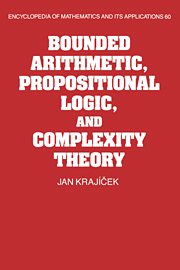Book contents
- Frontmatter
- Contents
- Preface
- Acknowledgments
- 1 Introduction
- 2 Preliminaries
- 3 Basic complexity theory
- 4 Basic propositional logic
- 5 Basic bounded arithmetic
- 6 Definability of computations
- 7 Witnessing theorems
- 8 Definability and witnessing in second order theories
- 9 Translations of arithmetic formulas
- 10 Finite axiomatizability problem
- 11 Direct independence proofs
- 12 Bounds for constant-depth Frege systems
- 13 Bounds for Frege and extended Frege systems
- 14 Hard tautologies and optimal proof systems
- 15 Strength of bounded arithmetic
- References
- Subject index
- Name index
- Symbol index
1 - Introduction
Published online by Cambridge University Press: 02 December 2009
- Frontmatter
- Contents
- Preface
- Acknowledgments
- 1 Introduction
- 2 Preliminaries
- 3 Basic complexity theory
- 4 Basic propositional logic
- 5 Basic bounded arithmetic
- 6 Definability of computations
- 7 Witnessing theorems
- 8 Definability and witnessing in second order theories
- 9 Translations of arithmetic formulas
- 10 Finite axiomatizability problem
- 11 Direct independence proofs
- 12 Bounds for constant-depth Frege systems
- 13 Bounds for Frege and extended Frege systems
- 14 Hard tautologies and optimal proof systems
- 15 Strength of bounded arithmetic
- References
- Subject index
- Name index
- Symbol index
Summary
Ten years ago I had the wonderful opportunity to attend a series of lectures given by Jeff Paris in Prague on his and Alec Wilkie's work on bounded arithmetic and its relations to complexity theory. Their work produced fundamental information about the strength and properties of these weak systems, and they developed a variety of basic methods and extracted inspiring problems.
At that time Pavel Pudlak studied sequential theories and proved interesting results about the finitistic consistency statements and interpretability (Pudlak 1985, 1986, 1987). A couple of years later Sam Buss's Ph.D. thesis (Buss 1986) came out with an elegant proof-theoretic characterization of the polynomial time computations. Then I learned about Cook (1975), predating the above developments and containing fundamental ideas about the relation of weak systems of arithmetic, propositional logic, and feasible computations. These ideas were developed already in the late 70s by some of his students but unfortunately remained, to a large extent, unavailable to a general audience. New connections and opportunities opened up with Miki Ajtai's entrance with powerful combinatorics applied earlier in Boolean complexity (Ajtai 1988).
The work of these people attracted other researchers and allowed, quite recently, further fundamental results.
It appears to me that with a growing interest in the field a text surveying some basic knowledge could be helpful. The following is an outline of the book.
Information
- Type
- Chapter
- Information
- Publisher: Cambridge University PressPrint publication year: 1995
Accessibility standard: Unknown
Why this information is here
This section outlines the accessibility features of this content - including support for screen readers, full keyboard navigation and high-contrast display options. This may not be relevant for you.Accessibility Information
- 1
- Cited by
